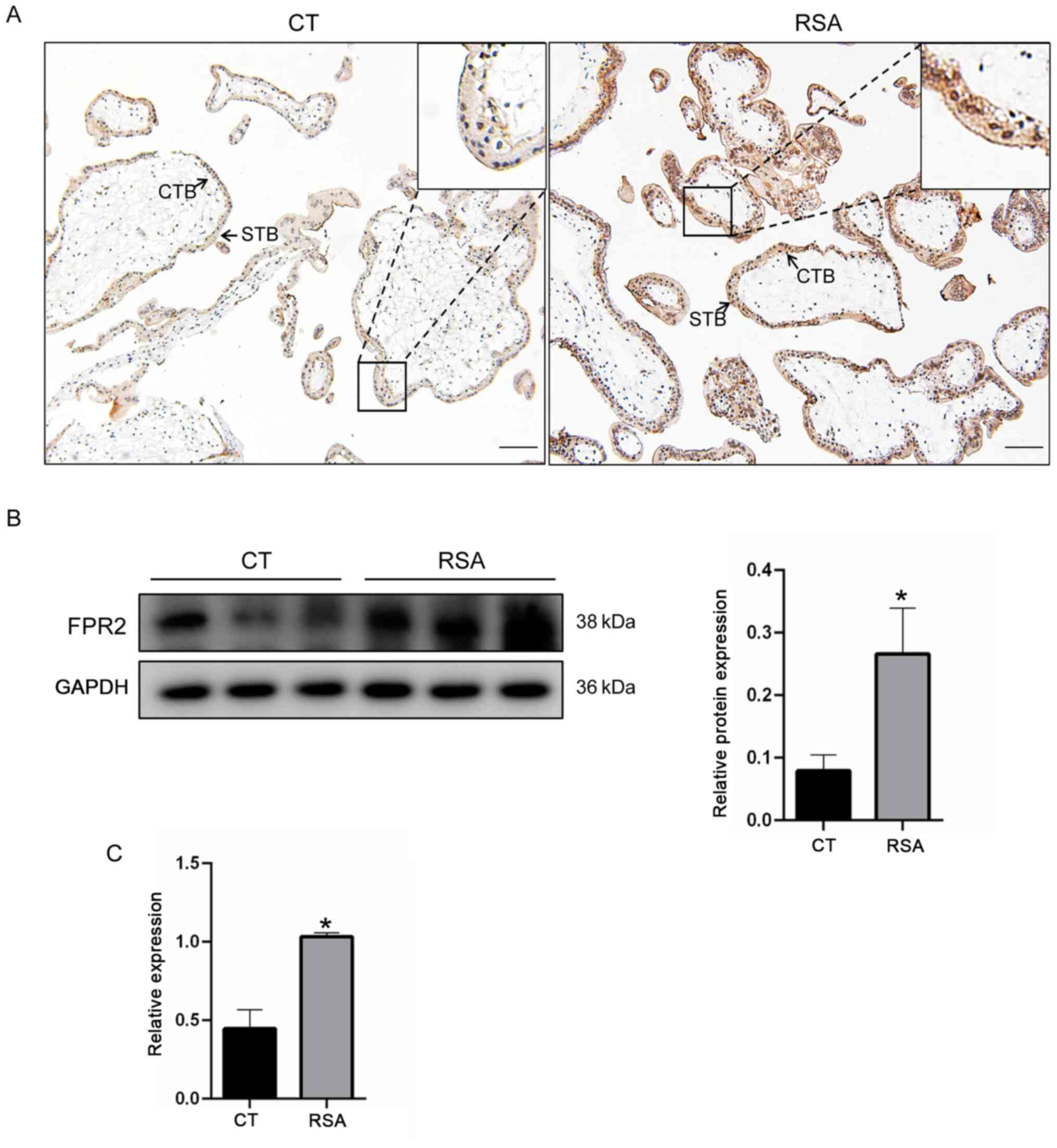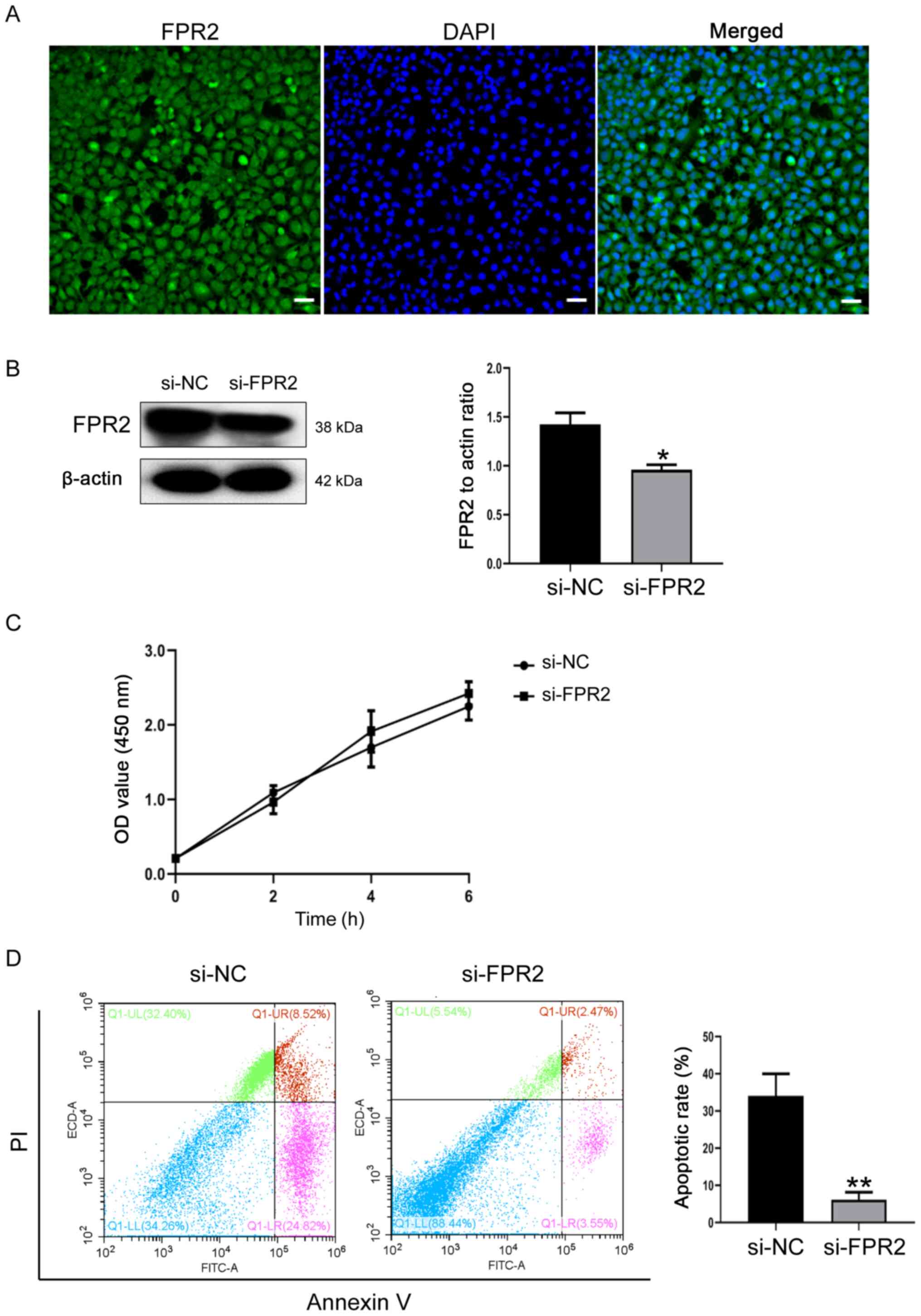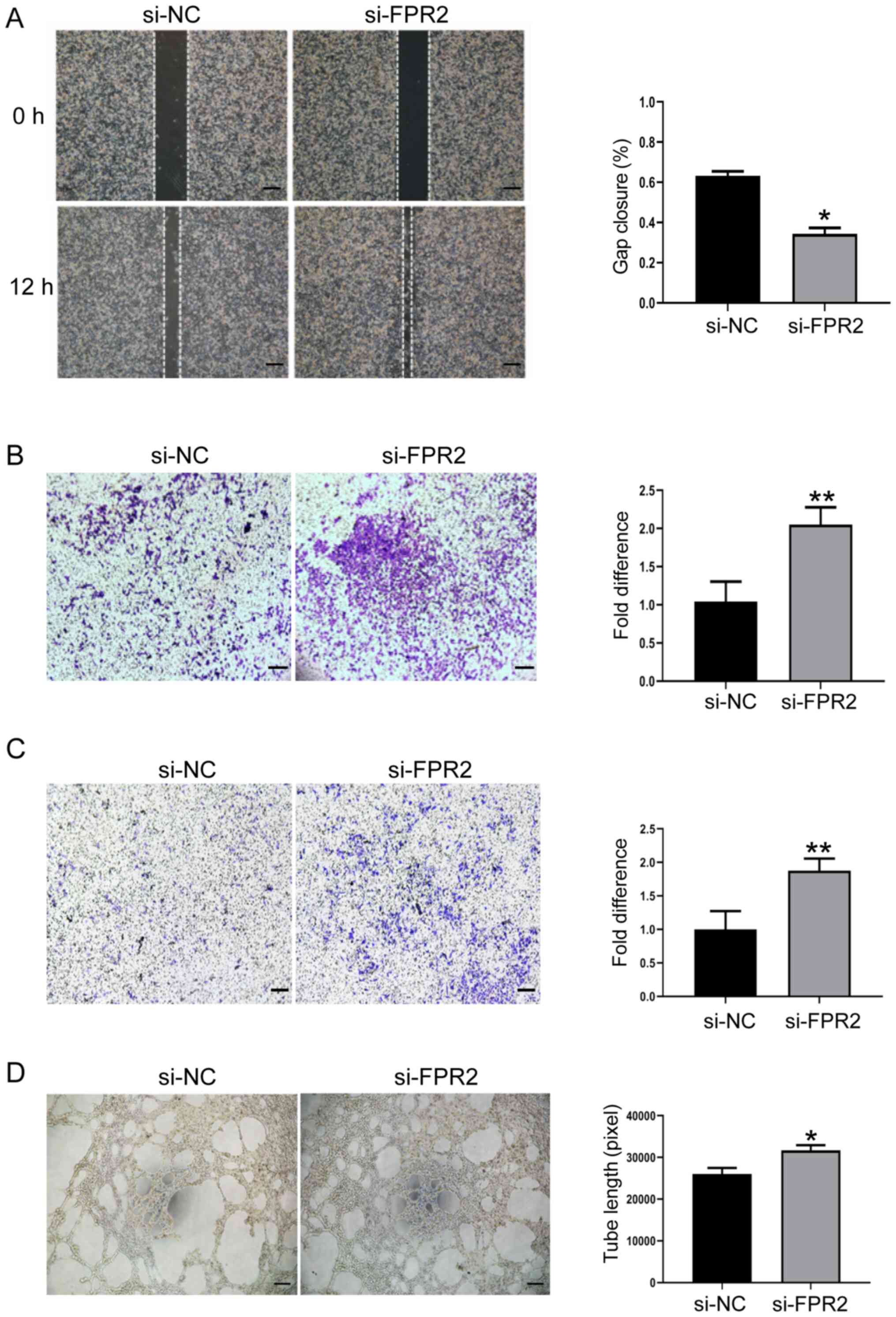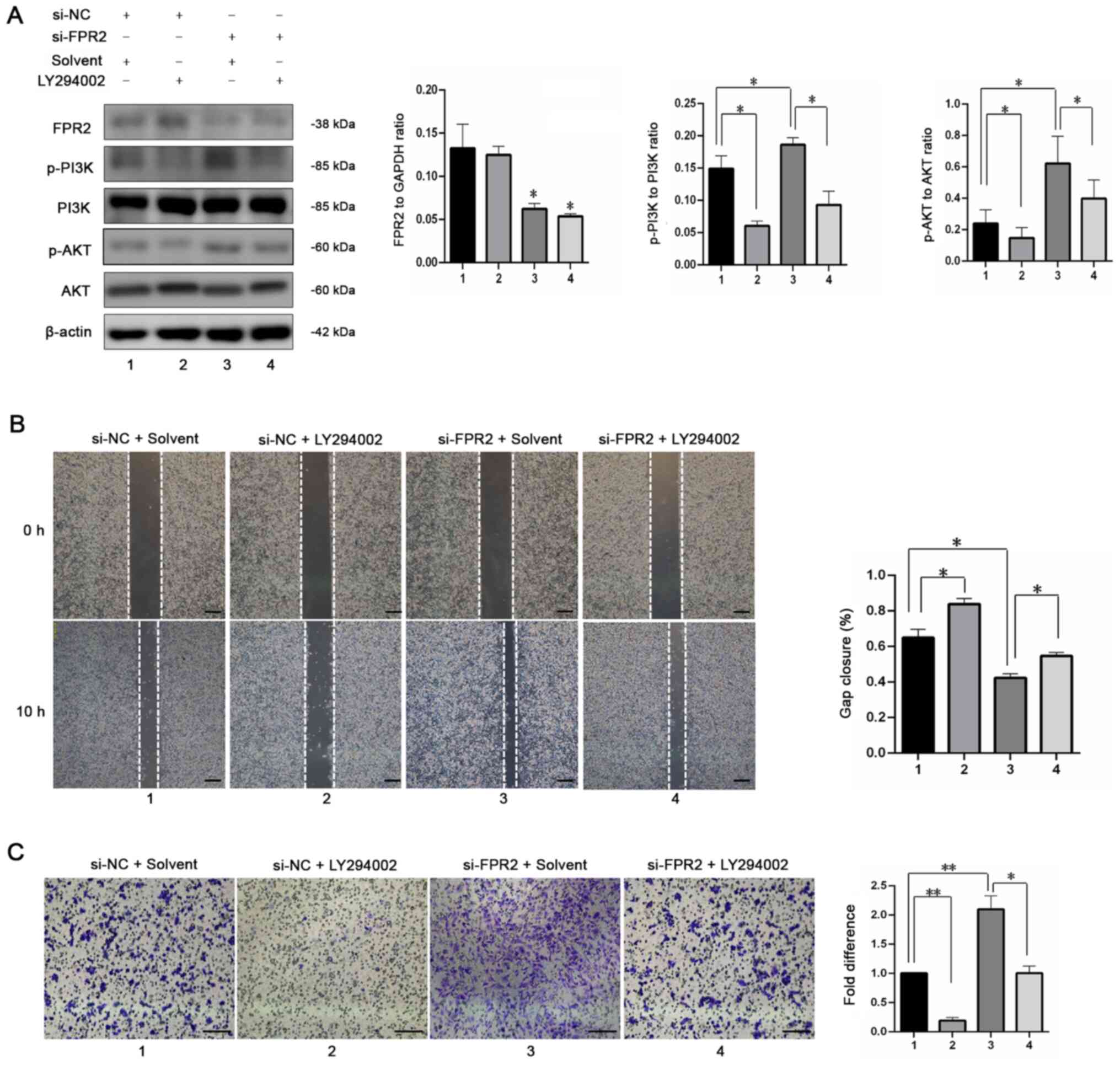|
1
|
Joob B and Wiwanitkit V: Zika and
spontaneous abortion. Bol Med Hosp Infant Mex. 77:462020.PubMed/NCBI
|
|
2
|
Van Leer P: Preventing spontaneous
abortion with progestin therapy. Am Fam Physician.
100(1)2009.PubMed/NCBI
|
|
3
|
Lee YH and Kim YC: Spontaneous resolution
of serous retinal detachment caused by choroidal mass after a first
trimester abortion. Yeungnam Univ J Med. 37:242–245. 2020.
View Article : Google Scholar : PubMed/NCBI
|
|
4
|
Xiang H, Yan H, Sun B, Feng F and Chen P:
Decreased expression of long non-coding RNA SNHG7 cause recurrent
spontaneous abortion through suppression proliferation and invasion
of trophoblast cells via miR-34a. Am J Transl Res. 11:463–472.
2019.PubMed/NCBI
|
|
5
|
Branch DW, Gibson M and Silver RM:
Clinical practice. Recurrent miscarriage. N Engl J Med.
363:1740–1747. 2010. View Article : Google Scholar : PubMed/NCBI
|
|
6
|
Zong S, Li C, Luo C, Zhao X, Liu C, Wang
K, Jia W, Bai M, Yin M, Bao S, et al: Dysregulated expression of
IDO may cause unexplained recurrent spontaneous abortion through
suppression of trophoblast cell proliferation and migration. Sci
Rep. 6:199162016. View Article : Google Scholar : PubMed/NCBI
|
|
7
|
Sun X, Tong X, Hao Y, Li C, Zhang Y, Pan
Y, Dai Y, Liu L, Zhang T and Zhang S: Abnormal Cullin1
neddylation-mediated p21 accumulation participates in the
pathogenesis of recurrent spontaneous abortion by regulating
trophoblast cell proliferation and differentiation. Mol Hum Reprod.
26:327–339. 2020.PubMed/NCBI
|
|
8
|
Li A, Zhang L, Li J, Fang Z, Li S, Peng Y,
Zhang M and Wang X: Effect of RvD1/FPR2 on inflammatory response in
chorioamnionitis. J Cell Mol Med. 24:13397–13407. 2020. View Article : Google Scholar : PubMed/NCBI
|
|
9
|
Murthi P, Rajaraman G, Erwich JJHM and
Dimitriadis E: Decreased placental FPR2 in early pregnancies that
later developed small-for-gestation age: a potential role of FPR2
in the regulation of epithelial-mesenchymal transition. Cells.
9:E9212020. View Article : Google Scholar
|
|
10
|
Lappas M, McCracken S, McKelvey K, Lim R,
James J, Roberts CT, Fournier T, Alfaidy N, Powell KL, Borg AJ, et
al: Formyl peptide receptor-2 is decreased in foetal growth
restriction and contributes to placental dysfunction. Mol Hum
Reprod. 24:94–109. 2018. View Article : Google Scholar : PubMed/NCBI
|
|
11
|
Xu Z, Zhao F, Lin F, Xiang H, Wang N, Ye D
and Huang Y: Preeclampsia is associated with a deficiency of
lipoxin A4, an endogenous anti-inflammatory mediator. Fertil
Steril. 102:282–290.e4. 2014. View Article : Google Scholar : PubMed/NCBI
|
|
12
|
Holdfeldt A, Sundqvist M, Dahlgren C and
Forsman H: Data showing effects of a PI3K-δ inhibitor on neutrophil
superoxide production during FPR2 activation and reactivation. Data
Brief. 32:1061852020. View Article : Google Scholar : PubMed/NCBI
|
|
13
|
Liu GJ, Tao T, Wang H, Zhou Y, Gao X, Gao
YY, Hang CH and Li W: Functions of resolvin D1-ALX/FPR2 receptor
interaction in the hemoglobin-induced microglial inflammatory
response and neuronal injury. J Neuroinflammation. 17:2392020.
View Article : Google Scholar : PubMed/NCBI
|
|
14
|
Korimová A and Dubový P: N-Formylated
peptide induces increased expression of both formyl peptide
receptor 2 (Fpr2) and Toll-like receptor 9 (TLR9) in Schwannoma
cells-an in vitro model for early inflammatory profiling of Schwann
cells. Cells. 9:E26612020. View Article : Google Scholar
|
|
15
|
Hoxhaj G and Manning BD: The PI3K-AKT
network at the interface of oncogenic signalling and cancer
metabolism. Nat Rev Cancer. 20:74–88. 2020. View Article : Google Scholar : PubMed/NCBI
|
|
16
|
Nitulescu GM, Van De Venter M, Nitulescu
G, Ungurianu A, Juzenas P, Peng Q, Olaru OT, Grădinaru D, Tsatsakis
A, Tsoukalas D, et al: The Akt pathway in oncology therapy and
beyond (Review). Int J Oncol. 53:2319–2331. 2018.PubMed/NCBI
|
|
17
|
Livak KJ and Schmittgen TD: Analysis of
relative gene expression data using real-time quantitative PCR and
the 2-ΔΔCT method. Methods. 25:402–408. 2001. View Article : Google Scholar : PubMed/NCBI
|
|
18
|
Li Z, Zhou G, Jiang L, Xiang H and Cao Y:
Effect of STOX1 on recurrent spontaneous abortion by regulating
trophoblast cell proliferation and migration via the PI3K/AKT
signaling pathway. J Cell Biochem. 120:8291–8299. 2018. View Article : Google Scholar : PubMed/NCBI
|
|
19
|
Cattaneo F, Russo R, Castaldo M, Chambery
A, Zollo C, Esposito G, Pedone PV and Ammendola R: Phosphoproteomic
analysis sheds light on intracellular signaling cascades triggered
by Formyl-Peptide Receptor 2. Sci Rep. 9:178942019. View Article : Google Scholar : PubMed/NCBI
|
|
20
|
Ammendola R, Parisi M, Esposito G and
Cattaneo F: Pro-resolving FPR2 agonists regulate NADPH
oxidase-dependent phosphorylation of HSP27, OSR1, and MARCKS and
activation of the respective upstream kinases. Antioxidants
(Basel). 10:342021.PubMed/NCBI
|
|
21
|
Larqué E, Ruiz-Palacios M and Koletzko B:
Placental regulation of fetal nutrient supply. Curr Opin Clin Nutr
Metab Care. 16:292–297. 2013. View Article : Google Scholar : PubMed/NCBI
|
|
22
|
Waechter V, Schmid M, Herova M, Weber A,
Günther V, Marti-Jaun J, Wüst S, Rösinger M, Gemperle C and
Hersberger M: Characterization of the promoter and the
transcriptional regulation of the lipoxin A4 receptor (FPR2/ALX)
gene in human monocytes and macrophages. J Immunol. 188:1856–1867.
2012. View Article : Google Scholar : PubMed/NCBI
|
|
23
|
Lamouille S, Xu J and Derynck R: Molecular
mechanisms of epithelial-mesenchymal transition. Nat Rev Mol Cell
Biol. 15:178–196. 2014. View
Article : Google Scholar : PubMed/NCBI
|
|
24
|
Burton GJ, Woods AW, Jauniaux E and
Kingdom JC: Rheological and physiological consequences of
conversion of the maternal spiral arteries for uteroplacental blood
flow during human pregnancy. Placenta. 30:473–482. 2009. View Article : Google Scholar : PubMed/NCBI
|
|
25
|
Georgiades P, Ferguson-Smith AC and Burton
GJ: Comparative developmental anatomy of the murine and human
definitive placentae. Placenta. 23:3–19. 2002. View Article : Google Scholar : PubMed/NCBI
|
|
26
|
Silva JF and Serakides R: Intrauterine
trophoblast migration: A comparative view of humans and rodents.
Cell Adhes Migr. 10:88–110. 2016. View Article : Google Scholar : PubMed/NCBI
|
|
27
|
Dagdelen M, Temur M, Yılmaz Ö, Altındag T,
Uslu T and Özbay PO: Placental bed apoptosis is increased in
pregnant women with pre-eclampsia versus normotensive pregnant
women. J Obstet Gynaecol. 36:974–979. 2016. View Article : Google Scholar : PubMed/NCBI
|
|
28
|
Graham CH, Hawley TS, Hawley RG,
MacDougall JR, Kerbel RS, Khoo N and Lala PK: Establishment and
characterization of first trimester human trophoblast cells with
extended lifespan. Exp Cell Res. 206:204–211. 1993. View Article : Google Scholar : PubMed/NCBI
|
|
29
|
Liu HN, Tang XM, Wang XQ, Gao J, Li N,
Wang YY and Xia HF: miR-93 inhibits trophoblast cell proliferation
and promotes cell apoptosis by targeting BCL2L2 in recurrent
spontaneous abortion. Reprod Sci. 27:152–162. 2020. View Article : Google Scholar : PubMed/NCBI
|
|
30
|
Abou-Kheir W, Barrak J, Hadadeh O and
Daoud G: HTR-8/SVneo cell line contains a mixed population of
cells. Placenta. 50:1–7. 2017. View Article : Google Scholar : PubMed/NCBI
|
|
31
|
Li J, Tian J, Yin H, Peng Y, Liu S, Yao S
and Zhang L: Chemical conjugation of FITC to track silica
nanoparticles in vivo and in vitro: An emerging method to assess
the reproductive toxicity of industrial nanomaterials. Environ Int.
152:1064972021. View Article : Google Scholar : PubMed/NCBI
|
|
32
|
Duan S, Zhang M, Li J, Tian J, Yin H, Wang
X and Zhang L: Uterine metabolic disorder induced by silica
nanoparticles: Biodistribution and bioactivity revealed by labeling
with FITC. J Nanobiotechnology. 19:622021. View Article : Google Scholar : PubMed/NCBI
|
|
33
|
Yin H, Li J, Tian J, Ma L, Zhang J, Zhai
Q, Yao S and Zhang L: Uterine pyruvate metabolic disorder induced
by silica nanoparticles act through the pentose phosphate pathway.
J Hazard Mater. 412:1252342021. View Article : Google Scholar : PubMed/NCBI
|
|
34
|
Yu Y, Xue S, Chen K, Le Y, Zhu R, Wang S,
Liu S, Cheng X, Guan H, Wang JM, et al: The G-protein-coupled
chemoattractant receptor Fpr2 exacerbates neuroglial dysfunction
and angiogenesis in diabetic retinopathy. FASEB Bioadv. 2:613–623.
2020. View Article : Google Scholar : PubMed/NCBI
|
|
35
|
Matte A, Recchiuti A, Federti E, Koehl B,
Mintz T, El Nemer W, Tharaux PL, Brousse V, Andolfo I, Lamolinara
A, et al: Resolution of sickle cell disease-associated inflammation
and tissue damage with 17R-resolvin D1. Blood. 133:252–265. 2019.
View Article : Google Scholar : PubMed/NCBI
|
|
36
|
Rüger M, Kipp E, Schubert N, Schröder N,
Pufe T, Stope MB, Kipp M, Blume C, Tauber SC and Brandenburg LO:
The formyl peptide receptor agonist Ac2-26 alleviates
neuroinflammation in a mouse model of pneumococcal meningitis. J
Neuroinflammation. 17:3252020. View Article : Google Scholar : PubMed/NCBI
|
|
37
|
Vital SA, Senchenkova EY, Ansari J and
Gavins FNE: Targeting AnxA1/Formyl Peptide Receptor 2 Pathway
Affords Protection against Pathological Thrombo-Inflammation.
Cells. 9:E24732020. View Article : Google Scholar
|
|
38
|
Xiang Y, Yao X, Chen K, Wang X, Zhou J,
Gong W, Yoshimura T, Huang J, Wang R, Wu Y, et al: The G-protein
coupled chemoattractant receptor FPR2 promotes malignant phenotype
of human colon cancer cells. Am J Cancer Res. 6:2599–2610.
2016.PubMed/NCBI
|
|
39
|
Lu J, Zhao J, Jia C, Zhou L, Cai Y, Ni J,
Ma J, Zheng M and Lu A: FPR2 enhances colorectal cancer progression
by promoting EMT process. Neoplasma. 66:785–791. 2019. View Article : Google Scholar : PubMed/NCBI
|
|
40
|
Sainz B Jr, Alcala S, Garcia E,
Sanchez-Ripoll Y, Azevedo MM, Cioffi M, Tatari M, Miranda-Lorenzo
I, Hidalgo M, Gomez-Lopez G, et al: Microenvironmental
hCAP-18/LL-37 promotes pancreatic ductal adenocarcinoma by
activating its cancer stem cell compartment. Gut. 64:1921–1935.
2015. View Article : Google Scholar : PubMed/NCBI
|
|
41
|
Red-Horse K, Zhou Y, Genbacev O,
Prakobphol A, Foulk R, McMaster M and Fisher SJ: Trophoblast
differentiation during embryo implantation and formation of the
maternal-fetal interface. J Clin Invest. 114:744–754. 2004.
View Article : Google Scholar : PubMed/NCBI
|
|
42
|
Zhao X, Jiang Y, Jiang T, Han X, Wang Y,
Chen L and Feng X: Physiological and pathological regulation of
autophagy in pregnancy. Arch Gynecol Obstet. 302:293–303. 2020.
View Article : Google Scholar : PubMed/NCBI
|
|
43
|
Kawczak P, Bober L and Bączek T:
Evaluation of Chemotherapeutic activity of the selected bases'
analogues of nucleic acids supported by ab initio various quantum
chemical calculations. Curr Computeraided Drug Des. 16:93–103.
2020. View Article : Google Scholar : PubMed/NCBI
|
|
44
|
Zhang W, Zuo M, Lu J and Wang Y:
Adiponectin reduces embryonic loss rate and ameliorates trophoblast
apoptosis in early pregnancy of mice with polycystic ovary syndrome
by affecting the AMPK/PI3K/Akt/FoxO3a signaling pathway. Reprod
Sci. 27:2232–2241. 2020. View Article : Google Scholar : PubMed/NCBI
|
|
45
|
Chen J, Yue C, Xu J, Zhan Y, Zhao H, Li Y
and Ye Y: Downregulation of receptor tyrosine kinase-like orphan
receptor 1 in preeclampsia placenta inhibits human trophoblast cell
proliferation, migration, and invasion by PI3K/AKT/mTOR pathway
accommodation. Placenta. 82:17–24. 2019. View Article : Google Scholar : PubMed/NCBI
|
|
46
|
Correia-Branco A, Keating E and Martel F:
Involvement of mTOR, JNK and PI3K in the negative effect of ethanol
and metformin on the human first-trimester extravillous trophoblast
HTR-8/SVneo cell line. Eur J Pharmacol. 833:16–24. 2018. View Article : Google Scholar : PubMed/NCBI
|
|
47
|
Li Y, Sun XL, Ma CL, Li C, Zhan Y, Li WT,
Li C and Wang YH: STX2 promotes trophoblast growth, migration, and
invasion through activation of the PI3K-AKT pathway in
preeclampsia. Front Cell Dev Biol. 9:6159732021. View Article : Google Scholar : PubMed/NCBI
|
|
48
|
Fresno Vara JA, Casado E, de Castro J,
Cejas P, Belda-Iniesta C and González-Barón M: PI3K/Akt signalling
pathway and cancer. Cancer Treat Rev. 30:193–204. 2004. View Article : Google Scholar : PubMed/NCBI
|


















